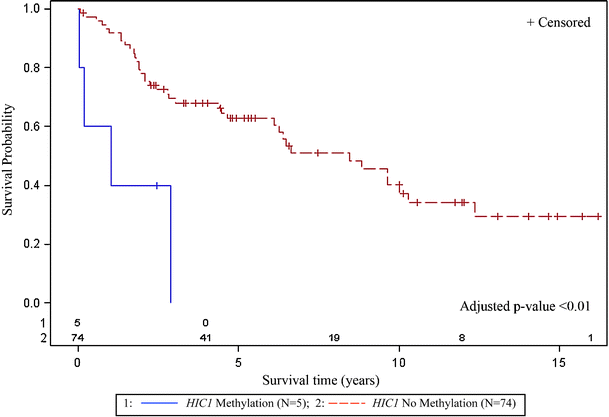DNA hypermethylation markers of poor outcome in laryngeal cancer
- PMID: 21318053
- PMCID: PMC3037188
- DOI: 10.1007/s13148-010-0005-3
DNA hypermethylation markers of poor outcome in laryngeal cancer
Abstract
This study examined molecular (DNA hypermethylation), clinical, histopathological, demographical, smoking, and alcohol variables to assess diagnosis (early versus late stage) and prognosis (survival) outcomes in a retrospective primary laryngeal squamous cell carcinoma (LSCC) cohort. The study cohort of 79 primary LSCC was drawn from a multi-ethnic (37% African American), primary care patient population, diagnosed by surgical biopsies in the Henry Ford Health System from 1991-2004, and followed from 5-18 years (through 2009). Of the 41 variables, univariate risk factors of p<0.10 were tested in multivariate models (logistic regression {diagnosis} and Cox {survival} models {p<0.05}). Aberrant methylation of ESR1 (p=0.01), race as African American (p=0.04), and tumor necrosis (extensive) (p=0.02) were independent predictors of late stage LSCC. Independent predictors of poor survival included presence of vascular invasion (p=0.0009), late stage disease (p=0.03) and methylation of the HIC1 gene (p=0.0002). Aberrant methylation of ESR1 and HIC1 signified independent markers of poorer outcome. In this multi-ethnic, primary LSCC cohort, race remained a predictor of late stage disease supporting disparate diagnosis outcomes for African American patients with LSCC.
Figures




Similar articles
-
Promoter hypermethylation of miR-34a contributes to the risk, progression, metastasis and poor survival of laryngeal squamous cell carcinoma.Gene. 2016 Nov 30;593(2):272-6. doi: 10.1016/j.gene.2016.07.047. Epub 2016 Jul 20. Gene. 2016. PMID: 27450916
-
[Study of mRNA expression level and hypermethylation of CHFR promoter in the laryngeal squamous cell carcinoma tissue].Lin Chuang Er Bi Yan Hou Tou Jing Wai Ke Za Zhi. 2010 Aug;24(15):673-7. Lin Chuang Er Bi Yan Hou Tou Jing Wai Ke Za Zhi. 2010. PMID: 20942233 Chinese.
-
Early death in supraglottic laryngeal squamous cell carcinoma: A population-based study.Ear Nose Throat J. 2024 Oct;103(10):650-658. doi: 10.1177/01455613221078184. Epub 2022 Feb 16. Ear Nose Throat J. 2024. PMID: 35171058
-
Human papillomavirus outcomes in an access-to-care laryngeal cancer cohort.Otolaryngol Head Neck Surg. 2012 May;146(5):730-8. doi: 10.1177/0194599811434482. Epub 2012 Jan 20. Otolaryngol Head Neck Surg. 2012. PMID: 22267491 Free PMC article.
-
LZTS2 promoter hypermethylation: a potential biomarker for the diagnosis and prognosis of laryngeal squamous cell carcinoma.World J Surg Oncol. 2018 Mar 2;16(1):42. doi: 10.1186/s12957-018-1349-y. World J Surg Oncol. 2018. PMID: 29499699 Free PMC article.
Cited by
-
Alterations of p14 ARF , p15 INK4b , and p16 INK4a Genes in Primary Laryngeal Squamous Cell Carcinoma.Pathol Oncol Res. 2017 Jan;23(1):63-71. doi: 10.1007/s12253-016-0083-4. Epub 2016 Jul 4. Pathol Oncol Res. 2017. PMID: 27377733
-
Expression of the tumor suppressor gene hypermethylated in cancer 1 in laryngeal carcinoma.Oncol Lett. 2015 May;9(5):2299-2302. doi: 10.3892/ol.2015.2983. Epub 2015 Feb 25. Oncol Lett. 2015. PMID: 26137060 Free PMC article.
-
Hepatocyte gene expression and DNA methylation as ancestry-dependent mechanisms in African Americans.NPJ Genom Med. 2019 Nov 25;4:29. doi: 10.1038/s41525-019-0102-y. eCollection 2019. NPJ Genom Med. 2019. PMID: 31798965 Free PMC article.
-
Molecular characterization of head and neck cancer: how close to personalized targeted therapy?Mol Diagn Ther. 2012 Aug 1;16(4):209-22. doi: 10.2165/11635330-000000000-00000. Mol Diagn Ther. 2012. PMID: 22873739 Free PMC article.
-
The tumor suppressor Hic1 maintains chromosomal stability independent of Tp53.Oncogene. 2018 Apr;37(14):1939-1948. doi: 10.1038/s41388-017-0022-1. Epub 2018 Jan 25. Oncogene. 2018. PMID: 29367758 Free PMC article.
References
-
- Arzimanoglou II, Hansen LL, Chong D, Li Z, Psaroudi MC, Dimitrakakis C, Jacovina AT, Shevchuk M, Reid L, Hajjar KA, Vassilaros S, Michalas S, Gilbert F, Chervenak FA, Barber HR. Frequent LOH at hMLH1, a highly variable SNP in hMSH3, and negligible coding instability in ovarian cancer. Anticancer Res. 2002;22(2A):969–975. - PubMed
Grants and funding
LinkOut - more resources
Full Text Sources
Miscellaneous
